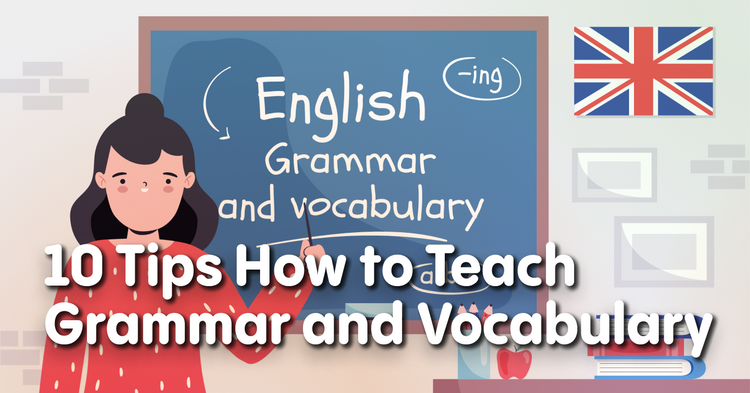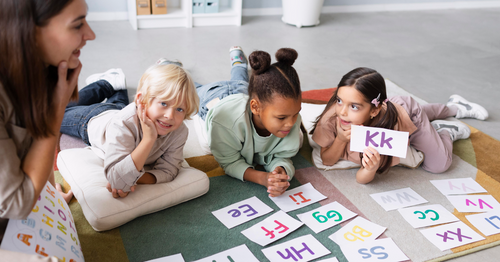In today's world, where English has become the universal language, it is crucial to teach English grammar and vocabulary to kids from an early age. However, traditional grammar rules can be tedious and uninspiring for many students, making it challenging for teachers to keep their students engaged.
With the help of resources from AllRight.com, teachers can easily access a variety of materials and activities to support their lesson plans and help their students become confident English speakers.
It is important to note that teaching English grammar and vocabulary to kids is not just about memorizing rules and definitions. Teachers should also aim to help students develop a love for the language and encourage them to practice their English language skills outside the classroom. By using fun activities, teachers can make grammar and vocabulary lessons more enjoyable for kids. Here are 10 ways to teach English grammar and vocabulary to kids, including a variety of activities and techniques.
1. Grammar and Punctuation Bingo
This fun game can be tailored to students of all ages. Teachers can create bingo cards that contain different instructions, such as “find a sentence written in the active voice.” The students are given a common resource, such as the latest issue of the Wall Street Journal, and must race to see who can get ‘BINGO’ first.
For a more comprehensive resource, teachers can try using AllRight.com's interactive lesson plans, games, and activities for grammar and punctuation.
2. Crossword Puzzles
Teachers can help students comprehend and practice sentence components, verb conjugations, and concepts like synonyms and antonyms by using a range of word puzzles that are accessible. Many are crossword puzzles, and the clues may include concepts like “the three-letter antonym for happy” or “the past tense of run.” Teachers can also try using interactive crossword puzzles 'Fun English Games' for an entertaining and engaging way to review English vocabulary.
3. Celebrity Biographies
Celebrity biographies can be used to teach different verb tenses and demonstrate students how grammar affects the meaning of words. Teachers can ask students to identify different verb forms used in the biography, such as past tense, present perfect, or past perfect. This exercise can help students understand how grammar can alter the meaning of a story.
4. Learning the Difference Between ‘A’ and ‘An’
The target audience for this activity is younger children. The teacher should cut out pictures or words of common nouns that the children interact with on a regular basis. Mix all the papers, divide the students into groups, and give each group a pile of sheets. Ask them to separate their sheets into piles, one for words that go with ‘a’ and the other for words that go with ‘an.’ Once the students have finished the activity, suggest a discussion and see if they can figure out the rule themselves. For more comprehensive resources, teachers can try using interactive videos and games from 'LearnEnglish Kids' that teach English grammar and vocabulary.
5. Put Your Students in the “Hot Seat”
Divide your class into two teams and choose one student from one team to sit in a chair facing the class with his/her back to the board. This person is "on the spot." Write a vocabulary word on the board so everyone can see it except the person on the chair. One at a time, team members give the person a clue about the mystery word. If the word is guessed before the two minutes are up, the team gets a point, and the play shifts to the other team. This game can be a fun and engaging way to test students' vocabulary knowledge.
6. Play a Game of Pop!
Students take turns drawing vocabulary words out of a bag, reading the word, and giving its definition. If they define the word correctly, they keep the card or the stick. If not, the card goes back in the bag. If they draw a card with the word "Pop!" they must return all their cards or sticks to the bag and start over. The player with the most cards or sticks at the end of the game wins. This game is ideal for teaching new vocabulary words and revising previous lessons.
7. Make a Word Map
Word maps can help deepen students' understanding of a vocabulary word by relating it to other words and concepts they already know. Teachers can ask students to brainstorm related words and concepts around a central vocabulary word, then create a visual representation of the word map.
8. Post a Graffiti Wall
A vocabulary graffiti wall is a collaborative word wall that can be used in the classroom or online. In the classroom, teachers can post vocabulary words on the wall and have students add sticky notes to illustrate the term (they can use words or pictures). Online, teachers can use tools like Padlet or Google Slides to create a virtual graffiti wall. This activity is suitable for middle school students and can help make learning new words more entertaining.
9. Vocabulary Charades
Charades is a classic game that can be adapted to teach vocabulary words. Teachers can create cards with different words and phrases for students to act out. Students can work in small groups, taking turns to act out the words while their teammates try to guess the correct vocabulary word. Teachers can also try using interactive vocabulary games from 'ESL Games Plus' for a fun and engaging way to practice English vocabulary.
10. Vocabulary Scavenger Hunt
A scavenger hunt is an exciting way to teach vocabulary words in context. Teachers can create a list of vocabulary words and phrases, then have students find examples of those words in the real world. This activity can be done individually or in groups, and it's a great way to get students actively engaged in the learning process. Teachers can also try using Cambridge English lesson plans and activities for teaching English vocabulary to young learners.
In conclusion, teaching English grammar and vocabulary to kids can be challenging, but it doesn't have to be boring. By using fun and engaging activities like bingo, crossword puzzles, celebrity biographies, and vocabulary charades, teachers can make the learning process more enjoyable for students. Additionally, activities like vocabulary short stories, scavenger hunts, and word maps can help deepen students' understanding of new words and concepts.
AllRight.com is a great opportunity for teachers to work with a large selection of engaging and effective teaching materials and ready-made lesson plans.
You can access a vast library of interactive lesson plans, games, and other resources on the convenient online platform. By incorporating these activities into their lesson plans, teachers can help their students become more confident and successful in their English language studies.









